
- •After reading tasks.
- •The Uses of Different Media
- •The mass media
- •The British Press
- •Why I Avoid Reading Ukrainian Newspapers and Magazines
- •Tv Invention
- •The Internet
- •Read the text, change or add new information to your notes.
- •Vocabulary Focus
- •I didn’t know that!
- •Questions 1-5
- •2.Questions 6-12
- •Indian cinema
- •Vocabulary
- •In pairs, use the context to work out the meaning of these expressions.
- •5 Найкращих історичних фільмів, які варто переглянути
- •Read the guidelines for writing a film review and confirm your answers
- •Directors
- •Interviewing Ingmar Bergman
- •Essential vocabulary
- •Vocabulary Notes
- •1. Paraphrase the following sentences using the word combinations and phrases:
- •2. Explain what is meant by:
- •3. Answer the following questions and do the given tasks:
- •Vocabulary exercises
- •1. Study the Vocabulary Notes and translate the illustrative examples into Ukrainian. Pay attention to the words and word combinations in bold type:
- •2. Paraphrase the following sentences using your active vocabulary:
- •3. Explain or comment on the following sentences:
- •4. Give English equivalents for the following phrases:
- •Violence On Screen
- •Дуже страшне кіно
- •Text interpretation
- •Intention/Purpose
- •Internal, deep structure?
- •Don't merely point out features. Say why the writer has used them and consider what the writer is trying to do. What? why? effect?
- •The scheme of the analysis of the fiction text (and some useful phrases)
- •The Sample of the Text Analysis The man of destiny
The Internet
The Internet (also known simply as "the Net" or "the Web") can be briefly understood as "a network of networks". Specifically, it is the worldwide, publicly accessible network of interconnected computer networks that transmit data by packet switching using the standard Internet Protocol (IP). It consists of millions of smaller domestic, academic, business, and governmental networks, which together carry various information and services, such as electronic mail, online chat, file transfer, and the interlinked Web pages and other documents World Wide Web.
Contrary to some common usage, the Internet and the World Wide Web are not synonymous: the Internet is a collection of interconnected computer networks, linked by copper wires, fiber-optic cables, wireless connections etc.; the Web is a collection of interconnected documents, linked by hyperlinks and URLs. The World Wide Web is accessible via the Internet, along with many other services including e-mail, file sharing and others described below.
Toward the end of the 20th century, the advent of the World Wide Web marked the first era in which any individual could have a means of exposure on a scale comparable to that of mass media. For the first time, anyone with a web site can address a global audience, although serving to high levels of web traffic is still relatively expensive. It is possible that the rise of peer-to-peer technologies may have begun the process of making the cost of bandwidth manageable. Although a vast amount of information, imagery, and commentary (i.e. "content") has been made available, it is often difficult to determine the authenticity and reliability of information contained in web pages (in many cases, self-published). The invention of the Internet has also allowed breaking news stories to reach around the globe within minutes. This rapid growth of instantaneous, decentralized communication is often deemed likely to change mass media and its relationship to society.
"Cross-media" means the idea of distributing the same message through different media channels. A similar idea is expressed in the news industry as "convergence". Many authors understand cross-media publishing to be the ability to publish in both print and on the web without manual conversion effort. An increasing number of wireless devices with mutually incompatible data and screen formats make it even more difficult to achieve the objective "create once, publish many".
Listening
The language of advertising
H

Now think of an example for each type from your country.
Persuasive advertising
Repetition The simplest kind of advertising. A slogan is repeated so often that we begin to associate a brand name with a particular product or service.
Endorsement A popular personality is used in the advertisement.
Emotional appeal Advertising often appeals to basics such as mother-love, sex, manliness, femininity.
Scientific authority Sometimes the advert shows a person in a white coat (i.e. a scientist) telling us about the product. More often it mentions 'miracle ingredients' or 'scientific testing' to persuade us.
'Keeping up with the Jones's' An appeal to pure snob value. You want to appear to be richer or more successful than your neighbours.
Comparison The advert lists the qualities of a product in direct comparison with rival products.
An appeal to fear or anxiety This type is similar to 3, but works on our fears.
Association of ideas This is usually visual. Until it became illegal in Britain, cigarette advertising showed attractive, healthy people smoking in beautiful rural situations.
9 9 Information If a product is new, it may be enough to show it and explain what it Joes.
Special offers/free gifts This is a very simple and direct appeal - it's half price!
Anti-advertising This is a modern version which appeals to the British sense of humour. It makes fun of the techniques of advertising.
Exercise 1
Listen to the advertisements on the recording. Complete the chart with the types of persuasion you think they are using. Write one number in each box, or two numbers if you feel an advertisement is using two types of persuasion.
A |
B |
C |
D |
E |
F |
G |
H |
I |
J |
|
|
|
|
|
|
|
|
|
|
Exercise 2
Discuss in groups what these advertisements are selling. Who might they appeal to?
Exercise 3
Some advertisements use little stories and dialogues. Work in groups to prepare an advertisement like this. Act it out
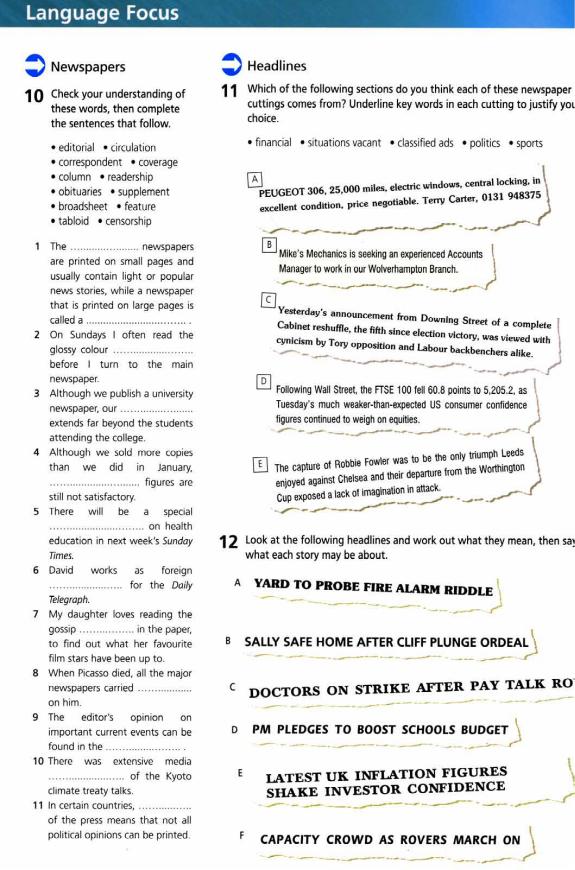
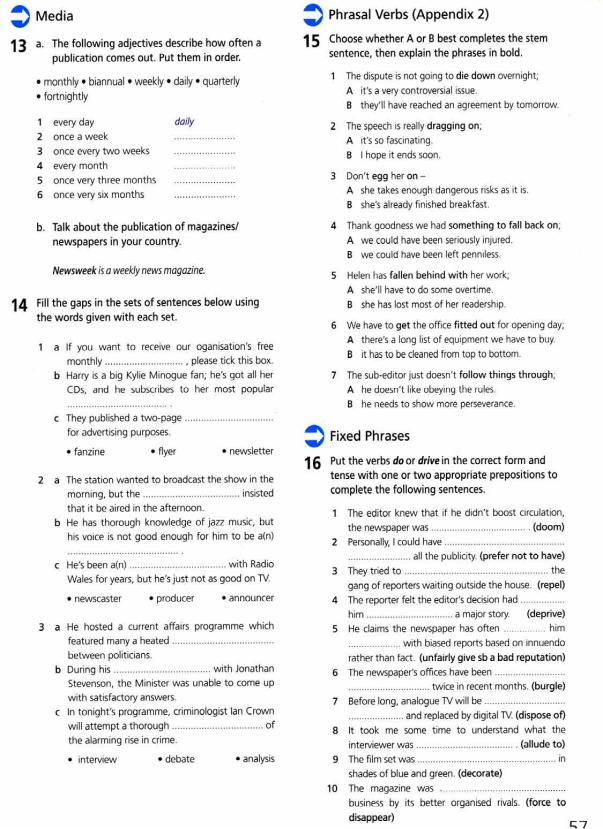
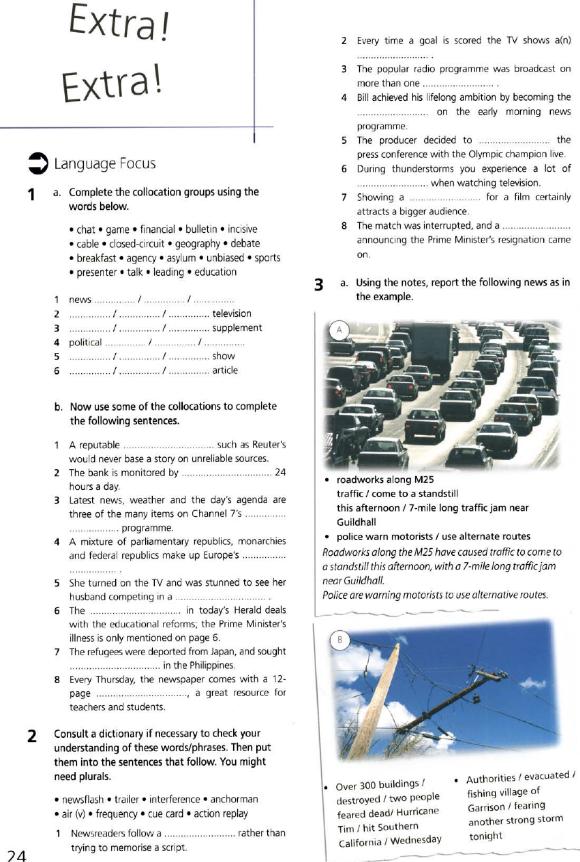
Censorship
How free are the media? Well - it varies from country to country. In some cases (e.g. Sweden and America) there are very few limits on what journalists can report. Other governments are slightly less liberal. In Britain, for example, there is an "Official Secrets Act". This means that it's against the law to report certain sensitive information about defence or intelligence matters.
And then there's a third group of countries which control their media very strictly. In cases like this broadcasters and journalists who break the law are frequently sent to prison or sometimes even killed.
Lack of freedom is a serious journalistic issue, but it's not the only one in the censorship debate. On the other side of the coin, some people believe journalists have too much freedom. The argument here is that newspapers often invade people's private lives and print sensational stories which are untrue. Should this be allowed to happen?
Put each of the following words or phrases in its correct-place below
moral standards perverted banned masquerading
unscrupulous excessive degrades safeguards
counter-productive infringes corrupting gratuitous
The amount of offensive material we are exposed to in films nowadays is surely (a) _______________. Most people accept that scenes of sex and violence are sometimes necessary to tell a story, but all too often these scenes are (b) _______________ ; they are unnecessary and simply inserted in the film to appeal to the baser human instincts. Censorship is necessary, especially to protect children from the (c) ______________ influence of such scenes, often (d) _____________ as art. in our cinemas. There should also be censorship of pornographic magazines produced by (e) ____________ people willing to cater to the (f) ___________ tastes of a small minority. Such material destroys the innocence of the young and (g) _________ all who read it. On the other hand, there are those who say that something which is (h) ____________ becomes desirable ;so censorship is (i) ______________ and that censorship (j) ______________ on our freedom of choice. However freedom is not merely freedom to do what we want but freedom from attempts to destroy society's (k) ______________ . Censorship provides the (l) ____________ by which society protects itself.
Answer the following questions.
What controls, if any, should there be over the media?
Should there be more censorship? Should there be less censorship?
What is your opinion of sexual and/or violent content in TV, films and video games?
Which is it more important to control - sexual or violent scenes? Why should they be controlled?
What effect, if any, do you think that sexual or violent scenes on the media have on people?
Do you think that countries with more censorship have less violent and sexual crime?
Do you think people were any less violent before the existence of television, films and video games?
Do you think censorship is a good thing or a bad thing? What are your reasons?










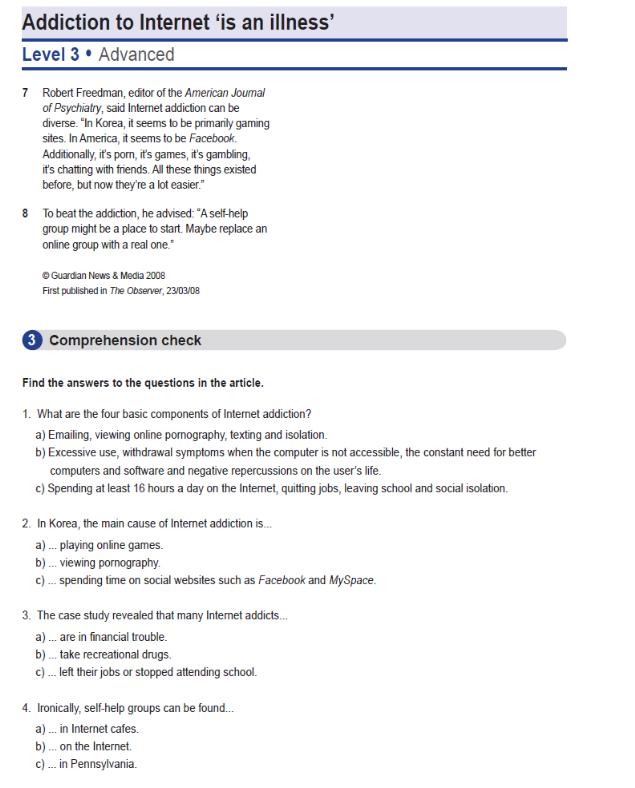









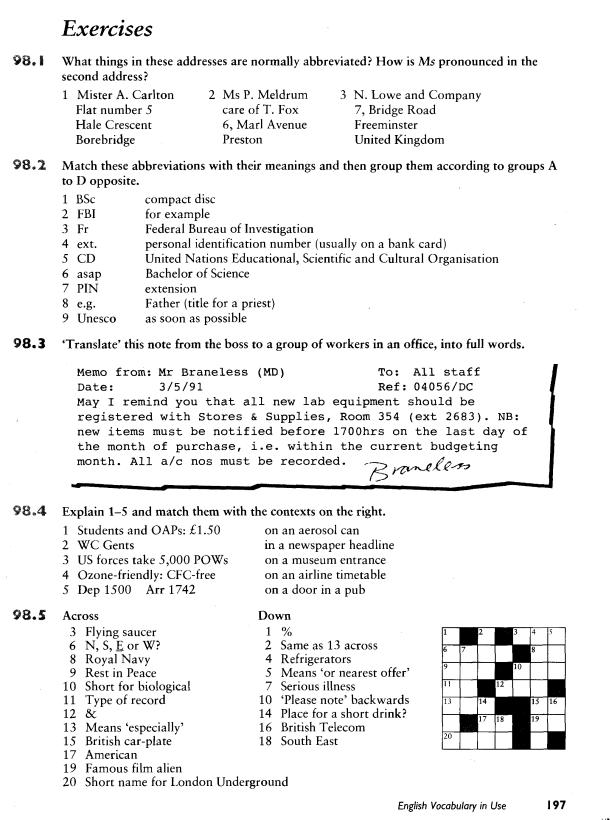
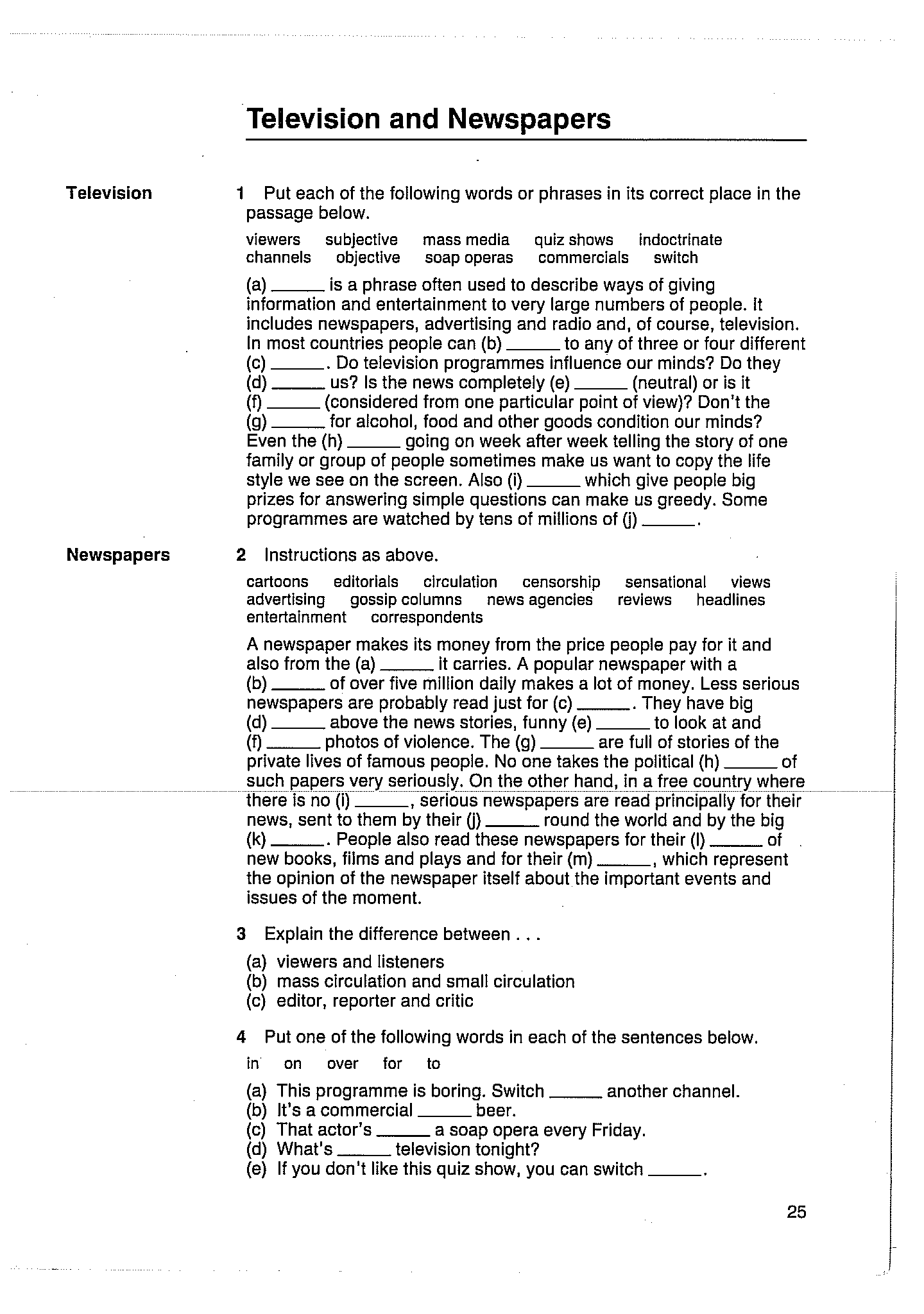
Discuss and Write Explain the sentences below in your own words.
• The liberty of the press is indeed essential to the nature of a free state: but this consists in laying no previous restraints upon publications, and not in freedom from censure for criminal matter when published. William Blackstone (English judge, jurist, and professor)
• Without an unfettered press, without liberty of speech, all the outward forms and structures of free institutions are a sham… if the press is not free, if speech is not independent and untrammeled; if the mind is shackled or made impotent through fear, it makes no difference under what form of government you live, you are a subject and not a citizen.
William E. Borah (United States Senator)
• All of us who professionally use the mass media are the shapers of society. We can vulgerize that society. We can brutalize it. Or we can help lift it onto a higher level.
William Bernbach (American advertising executive)
• Commercial jazz, soap opera, pulp fiction, comic strips, the movies set the images, mannerisms, standards, and aims of the urban masses. In one way or another, everyone is equal before these cultural machines; like technology itself, the mass media are nearly universal in their incidence and appeal. They are a kind of common denominator, a kind of scheme for pre-scheduled, mass emotions.
C. Wright Mills (American sociologist)
• What the mass media offers is not popular art, but entertainment which is intended to be consumed like food, forgotten, and replaced by a new dish.
W.H.Auden (English born American poet, dramatist and editor)
• False words are not only evil in themselves, but they infect the soul with evil.
Plato (Greek philosopher)
• The bosses of our mass media, press, radio, film and television, succeed in their aim of taking our minds off disaster. Thus, the distraction they offer demands the antidote of maximum concentration on disaster.
Ernst Fischer (German chemist and educator)
• As machines get to be more and more like men, men will come to be more like machines.
Joseph Wood Krutch (US naturalist)
• Computing machines perhaps can do the work of a dozen ordinary men but there is no machine that can do the work of one extraordinary man. E. B. White (US writer)
• I am a firm believer in the people. If given the truth, they can be depended upon to meet any national crises. The great point is to bring them the real facts. Abraham Lincoln (US president)
• The man who reads nothing at all is better educated than the man who reads nothing but newspapers. Thomas Jefferson (US president)
ЗМІ |
MASS MEDIA |
Визначити процес |
To designate a process |
Друковані засоби інформації |
Print(ed) media |
Читачі |
readership |
помічники засобів масової інформації |
adjuncts of the mass media |
Складне завдання |
Baffling task |
Націлений на |
To be aimed at |
збирати та поширювати інформацію |
to collect and distribute information |
коментар |
commentary |
вплив засобів масової інформації |
the impact of the mass media |
послугувати чому-небудь, виконувати роль |
to serve in smth |
Виконувати інформаційну роль |
To serve in information role |
на користь клієнтів |
in behalf of clients |
рекламні проспекти |
circulars |
асоціація новин = інформаційне агентство |
press association |
брошури |
pamphlets |
рекламні проспекти |
circulars |
Розважальні статті (матеріали, нариси) |
entertainment features |
презентувати точку зору рекламодавців |
to bring the views of commercial organizations |
другорядна інформація |
background information |
помічники засобів масової інформації |
adjuncts of the mass media |
Апелювати/звертатися до |
To appeal both to |
чуття зору та слуху |
the visual and auditory senses |
Висвітлювати події |
To cover the events |
оцінювати вплив повідомлення |
to gauge the impact of the message |
ефективні шляхи |
effective paths |
Сприяти комунікації |
To promote communication/to contribute to communication |
Центр уваги зосереджено на |
The focus is upon |
Персонал з чого-небудь |
Personnel in smth |
Редактор |
Editor |
Безперервний редактор |
continuity writer |
видавець |
publisher |
репортер; кореспондент |
Reporter |
журналіст; працівник газети (журналу) |
journalist |
диктор |
announcer |
коментатор; тлумач |
commentator |
Бульварна газета |
Tabloid/the gutter press/popular paper/rag |
Серйозна газета |
Quality newspaper/broadsheet |
Стаття |
Story/piece/article/issue |
Редакторська стаття/ передовиця |
Editorial |
Нарис |
A feature |
Заголовок |
A headline |
Сенсація |
A scoop |
Колонка світської хроніки |
Gossip column |
Некролог |
Obituary |
додаток |
supplement |
Колонка порад |
Advice column |
Програми телебачення/радіо |
Listings of TV/radio programmes |
розділ |
section |
Місцева газета |
Local newspaper |
Національна газета |
National newspaper |
Дівча/хлопець, що розносить газети |
A papergirl/boy |
Продавець періодики/ 2) газетний кіоск |
Newsagent 2) = news agent's |
Автомат з продажу газет |
Vending machine |
Підписуватися на |
To subscribe to |
Читачі |
readership |
Тираж |
circulation |
Огляд останніх подій |
News coverage |
Столична щоденна газета |
Metropolitan daily |
Встановити всеохоплююче визначення |
To establish an all-inclusive definition |
Удаватися до припущення |
Resort to conjecture |
Новини, орієнтовані на споживача |
Consumer-oriented news |
першорядний |
paramount |
Неупереджений, безпристрасний |
Unbiased |
Гострий, проникливий |
Incisive |
викриваючий |
Revealing |
безкомпромісний |
uncompromising |
Неупереджений |
Hard-hitting |
Правдивий |
Truth-searching |
прямувати наміченим шляхом |
To pursue the goal |
Бути приголомшеним новиною |
To be overwhelmed by the news |
Непряма відповідь (уклончивый) |
Evasive response |
недоречний |
Irrelevant |
Новизна |
Recency |
Забобони |
Superstitions |
Близькість |
Proximity |
Навпаки |
Conversely |
Непереборні перешкоди |
Insurmountable obstacles |
Націлювати увагу |
To place emphasis |
Неможливо недооцінити |
Impossible to underestimate |
Свобода слова |
Freedom of speech |
Втілювати |
Embody |
Численні помилки |
Numerous faults |
Зловживання владою |
The abuse of power |
Неправильно інформувати людей |
To misinform people |
Трактування фактів |
Interpretation of facts |
Відвідати |
To pay a visit |
Висловити бажання |
To express desire |
Чесний, відвертий |
transparent |
Потік інформації |
Flow of information |
Надто перебільшений |
Exaggerated |
Приховувати |
Conceal |
Відчувати, розуміти |
Conceive |
Сумнівні компанії з підтримки |
Dubious promotional campaigns |
Відповідне виконання |
Adequate fulfillment |
Навмисна дезінформація |
Deliberate misinterpretations |
Нав’язувати свої погляди читачам |
To impose views on the readers |
Навіювати (думку), знайомити |
indoctrinate |
Вміщувати статтю |
To feature an article |
Відігравати проникливу роль |
To play penetrating role |
Словесне повідомлення |
A word of mouth |
Головна новина |
Front news |
Сварка |
Squabble |
Бути рідкісним |
Scarce |
Ведучий теленовин |
Anchorman/newsreader/newscaster/to anchor a news/news presenter |
Прайм-тайм |
primetime |
Анонс, ролік |
Trailer |
реклама |
commercial |
Сповіщати |
To air |
В ефірі |
On the air |
Частота віщування |
frequency |
Картка-шпаргалка ведучого |
Cue card |
безглузда чутка, газетна вигадка |
Canard |
обман; містифікація |
Hoax |
Домисел/даремна інформація |
factoid |
Викладати погляди прилюдно |
To air the views in public |
Подавати в суд за наклеп |
To sue for libel |
Безсовісні журналісти |
Unscrupulous journalists |
Втручатися |
To interfere/intrude |
Блок екстрених повідомлень |
newsflash |
Вартий новин |
Newsworthy |
Замовчування |
Muzzling |
Встановити цензуру |
To impose censorship |
Безпринципний |
unscrupulous |
Протилежний тому, що хотілося |
Counter-productive |
Викривлений, збочений |
perverted |
надмірний |
excessive |
перекручений, викривлений (текст) |
corrupting |
На належному рівні |
Up to scratch |
Звільнити |
Lay off |
Почати з нуля |
From scratch |
Брати хабарі |
To receive hush money |
Виправитися, почати жити по-новому |
To turn over a new leaf |
Видати секрет |
To spill the beans |
відкладати |
To shelve |
З нуля |
From scratch |
Брати слова назад |
To eat one’s words |
В чому мати народила |
In one’s birthday suit |
Безутішний |
Broken-hearted |
Результати вирішені |
In the bag |
Бути в курсі подій |
To be in know/to be current with/be well-informed |
довольный как слон |
To be thrilled to bits |
на седьмом небе |
To be in the seventh heaven |
быть наверху блаженства, на седьмом небе |
To be over the moon |
в унынии, в плохом настроении, в подавленном состоянии; ≈ как в воду опущенный |
To be down in the dumps |
грустить |
To feel blue |
дойти до предела (сил); исчерпать свои возможности; дойти до точки |
To come to the end of one's tether |
быть в крайнем недоумении, не знать, что делать, как поступить, стать в тупик |
Be at one's wit's end (be at one's wit's (или wits') end) |
|
Nothing to write home about Nothing to boast of/Life is going its usual way |
MODULE 1.2 CINEMA
TOPIC AREAS
How a Film is Made
History of Cinematography
Film Review
LEARN/REVISE
Cinema = (motion) picture = (feature) film = movie = flicks (Br.)
Programme – репертуар
Performance / show/ to show / to film
Film premiere = first night
To release a film - to make it available for seeing at the usual network of cinemas
To be a hit with the audience
Director, producer, manager
Note: there is no general expression denoting a person who works in the cinema, like працівник кіно.
Director / art-director / designer / producer/ manager /production manager
To produce is used in two meanings: 1. to finance 2.to create, make ( in a general sense).
E.g.: This is one of the best films produced in Britain during 1990s.
Production / joint / со- production
Script:
Scriptwriter / script / screenplay / scenario
The screenplay is the full text, with dialogues, descriptions of characters and setting, directions about movements, etc.
The scenario is the first stage, an outline, a sketch, scene by scene, but with no dialogue, directions, etc.
Note: за романом, оповіданням - to be based on, not after. Of may be used in such sentences as: Have you seen the film of “Crime and Punishment"?
The story has been made into a film, aimed or adapted for the screen. In this case it is the film / screen version / adaptation of the book.
A scenario or screenplay which is not based on a book, but invented by the scriptwriter, or director, may be called an original scenario/screenplay.
Film actors/actresses
Co-star is used if there are two main characters played by stars.
Зніматися у фільмі - to make / to appear / to be in a film / to star.
Cast - the actors and actresses appearing in a film.
Leading / title / supporting / cameo roles; minor parts / bit-parts; the protagonist of the film
(Film) extra is often an untrained actor/actress, who takes a minor part in a film, especially in crowd scenes (статист, статистка, актор масовки).
Stuntman is a person employed to perform dangerous stunts as a stand-in for an actor in films.
Sets, scenery, props
In the cinema sets (декорації) is generally preferable to scenery, as scenery may also mean natural scenery such as rural fields, hills, rivers, etc, seen in a film (пейзажі).
On location means in a natural setting, either out-of-doors or in some building (на натурі),as opposed to in the studio.
Cameraman, camerawork
The cameraman is responsible for the photography or the camerawork. His assistants are called the camera crew.
To shoot / shooting / shot
A close-up is a shot taken at close range and showing something in detail (великий план).
A long shot is taken with a long, panoramic distance between the camera and the subject (кадр, знятий загальним планом).
A flashback is a shot or series of shots (sometimes a whole scene) showing something which happened earlier (ретроспекція, зворотній кадр).
Slow motion is used when a movement or scene is shown much more slowly than it appears in real life, for an artistic effect. The opposite device in non-formal style is called speeded up.
Movie mistakes/flubs/blunders/bloopers/goofs/inaccuracies
Sound-track, dub, subtitles
The sound-track (фонограма) is the recording of all the sounds in a film: dialogue, background noises, sound effects, music. The person responsible for this recording is the soundman (mixer).
Foreign films may be dubbed when the original sound-track is replaced by a new one with dialogue in the language of the country, where it is to be shown.
Instead of being dubbed, a foreign film may be given subtitles.
The credit titles, or credits (титри) are the names, shown on the screen, of the director, producer, the cast and the crew.
There is no English equivalent for the word серія in reference to films (part/episode may be used). Series means several, a succession (цикл, серіал) – every part is a new story. Serial - a story or play appearing in regular installments on television or radio or in a magazine or newspaper.
Long-drawn-out is used in the meaning of розтягнутий.
Silent films, talkies
Films made before the invention of sound recording are called silent films. Talkie is used only in connection with the history of the cinema.
Genres /types of films
Feature films/ documentaries / cartoons / newsreels
Comedy, tragedy, classics, drama, historical film, war film, epic, thriller, musical, soap opera, horror film, mystery and suspense, Western, science fiction, chick flick, sitcom, romcom, art house film, blockbuster
Slapstick (comedy), burlesque, satire, farce
Length of films
Most feature films last about an hour and a half. They are called full-length films. Films lasting only 15 -30 minutes are called short films or shorts in professional language
Films for different age-groups
In Britain, films are classified according to their suitability for children or adults by the BRITISH BOARD OF FILM CENSORS, which gives each film a certain certificate.
U film is suitable for all age groups. A film is suitable mainly for adults. However, children may be admitted if accompanied by adults X film is considered definitely unsuitable for children.
Television
Television: telly (colloq.), the (goggle) box (BE); the tube (AE); portable television (set); cable television; satellite television; viewer; viewing; peak viewing hours; prime time (8-11 p.m.); theme tunes; TV addict.
Operating TV set: to switch on/off; to turn on/off; to turn the sound up/down; to switch (over)/ change to another programme/channel; to correct the picture; to have the TV set fixed.
Personnel/People in television: to be in television; announcer; newsreader / newscaster; anchorman / anchorwoman (AE); presenter; TV reporter/correspondent; commentator; interviewer; speaker; quizmaster; technician; a programme crew.
Programmes: the news/ breaking news/update; current affairs programme; special report; factual reportage; live footage (AE); talk (chat); discussion; panel discussion; interview; children's programme; educational programme; wild/nature-life programme; sports programme; the weather report/forecast; variety show; musical variety; game show; quiz programme, television play/film; television version of a play (adapted for television); sitcom (situational comedy); commercial; video clip; a regular character of the programme; a regular feature programme.
Television techniques: to broadcast; to telecast (AE); a live broadcast/show programme; to do a live broadcast; to be on the air; a broadcast speech/interview/discussion; to be on TV (What's on TV tonight?); to appear on the programme; to show on television; to cover something; news television / coverage; recorded/ taped/videotaped programme; to do a television show; library film/pictures (archives material); microphone, mike, neck mike; monitor; screen time.
Ex 1. Complete the sentences with movie terms from the box. Use your dictionary if necessary.
dubbed |
subtitled |
on location |
soundtrack |
credits |
studios |
screenplays |
flashback |
stunts |
|
|
|
|
|
At the end of the movie, you can read the names of the actors and of all the people who worked on the film in the _________.
When a movie is_______, actors speak the dialog in a language different from the original.
For many popular movies, you can buy a CD of the music from the__________.
In a ___movie, you read the dialog translated into another language at the bottom of the screen.
It’s sometimes very expensive to shoot a movie _________.in the actual place where the story takes place
During a _________in a movie, the action goes back to an earlier time in the story
Special actors do dangerous _______such as crashing cars or jumping out of burning buildings.
Many movies are made in _______ which have areas that look like different parts of the world.
The _______for some famous movies are based on popular novels.
Ex 2. Match the questions and answers about movies.
1. What kind of movie is it? a. A new director that I’ve never heard of.
2. What’s it about? b. Tom Cruise and Julia Roberts.
3. When was it made? c. A few years ago, I think.
4. Where is it from? d. Kind of slow at first, but the end is really scary!
5. Who’s in it? e. At Cine Club, downtown.
6. Who’s it by? f. China. It’s subtitled in English.
7. Where is it showing? g. A detective story.
8. How is it? h. Two guys who are in love with the same woman.
Ex 3. The moving image
Speaking
1) Discuss the following quotations. What common theme links them?
'The telephone has too many shortcomings to be seriously considered as a means of communication. The device is inherently of no value to us.' Western Union internal memo, 1876
'Who the hell wants to hear actors talk?'H.M. Warner, Warner Brother, 1927
'The wireless music box has no imaginable commercial value.' Business response to appeal for investment in radio during the 1920s
‘Television will never be a serious competitor for radio because people must sit and keep their eyes glued to a screen; the average American family hasn’t time for it.’ The New York Times, 1939
‘I think there is a world market for maybe five computers.’ Thomas Watson, chairman of IBM, 1943
2) Imagine you could talk to one of the people quoted. Explain how wrong their prediction was, using evidence from today’s world.
3) What do you think has been the greatest advance in the media in the last ten years? What changes could occur in the next ten years?
Listening
1) What features would you expect to find in a ‘typical’ Hollywood film?
2) You will hear an extract from a radio programme in which a film critic, Dan Sheldon, is interviewed about Hollywood and the part it has played in the film industry. Before you listen, read the multiple- choice questions below.
1 After the early French documentaries, film-markers became interested in
A illusion and reality.
B the effect of movement.
C adapting stories for film.
D manipulating plot.
2 The use of mass production techniques in films led to
A further technological developments.
B the establishment of Hollywood.
C the rise of the studio system.
D the development of specialized genres.
3 The speaker says colour was different from sound because
A its impact on film-making was more gradual.
B it was not accepted by some film enthusiasts.
C its arrival was associated with a particular film.
D it was more technologically complex.
4 According to the speaker, what stopped the decline in Hollywood films?
A the development of cheaper means of production
B the introduction of new genres
C the identification of younger audience
D the rise of video
5 The speaker suggests that in the future
A film stars will be less remote.
B the viewer will be more directly involved.
C there will be more film ‘packages’.
D new film genres will develop.
3) Now listen and choose the answer (A, B, C or D) which fits best according to what you hear.
4) Discuss these questions.
1 Can you think of a film you have enjoyed recently that was not made in the USA?
2 How important is the film industry in the country where you live, and what kinds of film are produced?

A critic is a person who writes reviews: My sister is a movie critic for Today magazine.
A critique is a detailed written explanation of problems and their causes: Dr. Lee is writing a critique of the health care system in our country.
Watch out
see and watch
You can watch TV, or you can see something on TV, but you don’t “see TV.'
We watched TV until midnight last night.
I saw an interview with the president on IV.
I saw television after dinner.
Reading Passage 1
How the Film is Made
Pre-reading
Write down the responsibilities of these people participating in shooting a film:
Cameraman, director, camera assistant, production manager, soundman, clapper boy, a continuity girl
